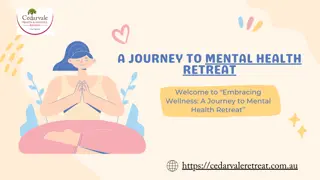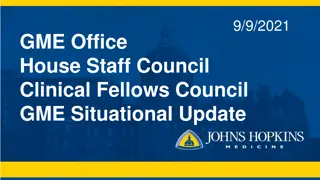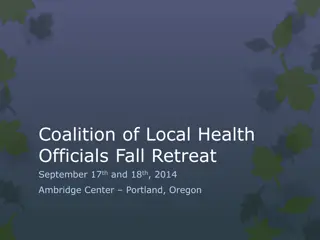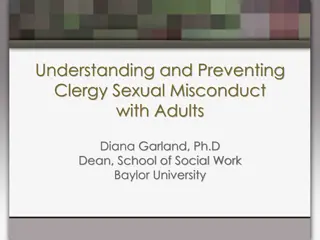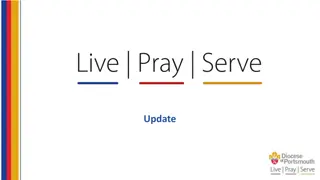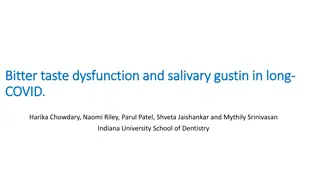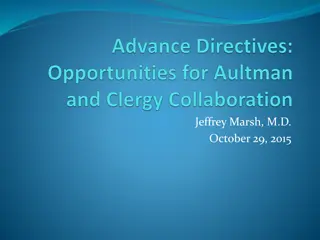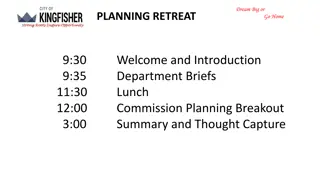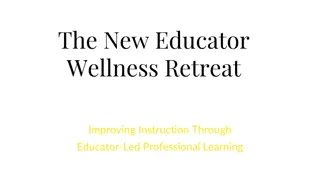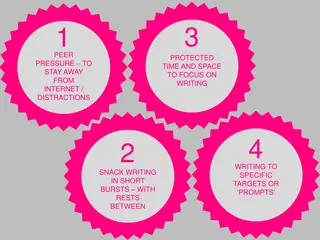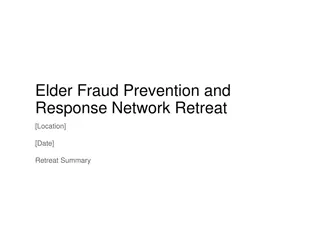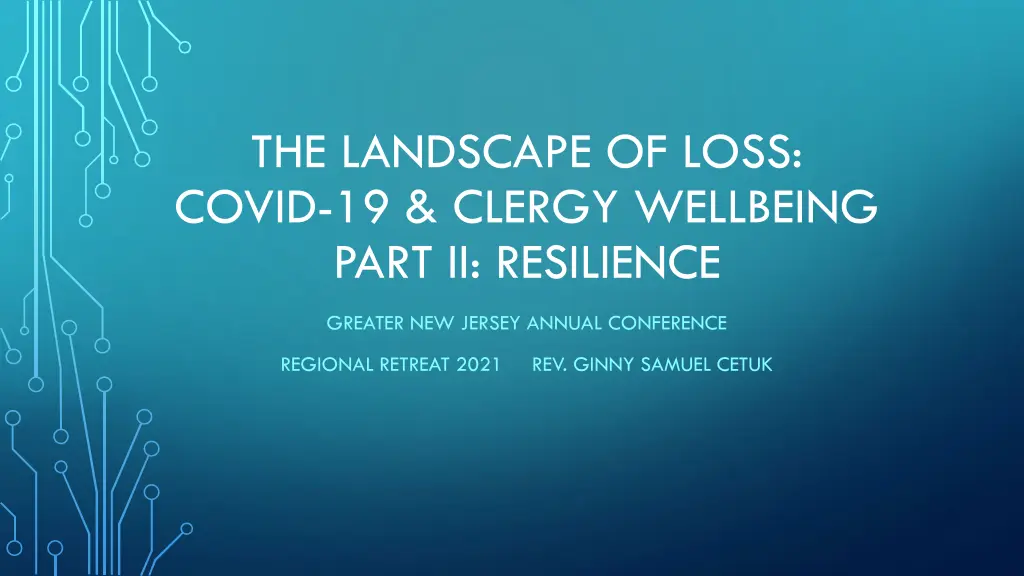
Understanding Emotional Exhaustion and Building Resilience for Well-being
Learn how to recognize emotional exhaustion and discover strategies to build resilience for better mental health. Explore the signs, causes, and solutions for emotional exhaustion, as well as key elements to enhance personal resilience and overcome adversities.
Download Presentation

Please find below an Image/Link to download the presentation.
The content on the website is provided AS IS for your information and personal use only. It may not be sold, licensed, or shared on other websites without obtaining consent from the author. If you encounter any issues during the download, it is possible that the publisher has removed the file from their server.
You are allowed to download the files provided on this website for personal or commercial use, subject to the condition that they are used lawfully. All files are the property of their respective owners.
The content on the website is provided AS IS for your information and personal use only. It may not be sold, licensed, or shared on other websites without obtaining consent from the author.
E N D
Presentation Transcript
THE LANDSCAPE OF LOSS: COVID-19 & CLERGY WELLBEING PART II: RESILIENCE GREATER NEW JERSEY ANNUAL CONFERENCE REGIONAL RETREAT 2021 REV. GINNY SAMUEL CETUK
YOURE PROBABLY EMOTIONALLY EXHAUSTED Emotional exhaustion is like physical exhaustion. But rather than being your body being tired, it s your mind. Brittany A. Johnson, LMHC Emotional exhaustion may happen when: Stress increases and you don t process the feelings that pop up as life throws you curve balls. When stress comes up, even though it may be a time when we feel the need to keep going, it s a time when we need to slow down most and take care of ourselves. Kruti Patel, PhD, Deep Eddy Psychology
IF YOU FIND YOURSELF WAKING UP FROM ADEQUATE SLEEP AND STILL FEELING HEAVY OR TIRED or that it s difficult to form clear thoughts and your normal coping skills aren t working, it may be emotional exhaustion. If you feel like you can t catch your breath, you don t have the energy to recover, or like you re just above the surface staying afloat it s more than stress or anxiety. Kruti Patel, PhD. We re all more likely to experience it during times of fear, uncertainty, and collective upheaval, like we re currently facing. https://blog.fitbit.com/emotional -exhaustion
WHAT TO DO IF IT PERSISTS If you try using coping skills and make changes but things aren t improving within a week, or if your emotional exhaustion is impacting other areas of your life such as relationships, work or your ability to function, consider seeing a therapist or psychologies for extra support. Brittany A. Johnson, LMHC
RESILIENCE: PART OF THE BALM OF GILEAD Resilience is defined as the capacity to adapt to and recover from adversity. Many life experiences can teach us ways to disconnect from our natural capacity to adapt and grow, preventing us from being as resilient as we really are. The elements below can help us identify patterns we want to unlearn or unsubscribe from, as well as ways we may wish to increase our personal resilience. 7 Keys to Sustainable Resilience, Jessica Del Pozo, PhD. Being Awake Better
INCREASE/REDUCE RESILIENCE Vulnerability (Unlearning Defensiveness): Emotional Vulnerability is having the courage to show up honestly and be seen as we are when we have no control over the outcome. Compassion: (Unlearning Indifference) Individuals with self- compassion have reported less distress in the face of difficulties along with higher heart rate variability, a physiological measure of health and well-being.
INCREASE/REDUCE RESILIENCE Creativity (Unlearning Indifference): creativity in everyday thinking is an important element of resilience .we all have the capacity to create it could even be considered a birthright! Stagnation vs Flow: Flow is the state of active engagement where skills and talents are aligned with the demands of the task. It is experienced as a sense of immersion in which time and the self face as we become wrapped in the energy of the process.
INCREASE/REDUCE RESILIENCE Optimism: (Unlearning Pessimisim) Optimism is our expectation that the future will be good and that adverse events are temporary and specific, rather than permanent and global. Optimists report higher levels of positive emotions and have been found to have higher resting HRV. Writing our gratitudes, tracking what we do well each day can increase well-being. While you can t control your experience, you can control your explanations. (Martin Seligman, founder of Positive Psychology.)
INCREASE/REDUCE RESILIENCE Grit: (Unlearning Fragility) Grit is persistence times perseverance times determination and dedication. Grit has been found to be a much stronger predictor of success than test scores, where you attended school, or how naturally talented you are. I think of grit as passion tempered with patient persistence.
INCREASE/REDUCE RESILIENCE Growth Mindset: (Unlearning Fixed Mindset) A growth mindest fosters curiosity and passion for learning, helps us embrace risk, and choose a response when thigs don t go out way. Needing to constantly prove our worth while believing our personal characteristics are fixed can leave us susceptible to feelings of failure. Similar to grit, growth mindset is a belief in effort, resilience and growth in the face of obstacles.
WHAT CREATES RESILIENCE?* A positive attitude which can blunt the impact of stress on mind and body The ability to regulate emotions The ability to see failure as a form of helpful feedback Breaking out of negative thought cycles Pushing back against catastrophizing Looking for upsides when faced with setbacks. *psychologytoday.com
HOW TO BUILD RESILIENCE* Identify contributing factors in the situation that are specific and temporary. Accept that life is a mix of losses and wins. Getting enough sleep Eating well and exercising Regularly thinking about and living according to one s moral values. *https://www.psychologytoday.com/us/basics/resilience
LOCUS OF CONTROL* A locus of control can be internal meaning that an individual perceives that they are in control of what happens to them or external, meaning that an individual attributes all that happens to them to external factors. Bringing an external locus of control inward requires a significant mindset change; like any skill, it takes practice and repetition. In the short term, it helps to work on being decisive and taking concrete actions when faced with adversity rather than responding passively. *https://www.psychology today.com/us/basics/resilience
BUILDING YOUR RESILIENCE* Build your connections call your clergy friends. Join a group Take care of your body. Practice mindfulness Avoid negative outlets -- manage the stress, not eliminate it Help others (we are golden here!!)
BUILDING YOUR RESILIENCE* Be proactive: What CAN I do about this particular problem? Move toward your goals. Develop realistic goals each day. Keep things in perspective and learn from your past. Accept change and maintain a positive outlook. Seek professional help when you need it. *https://www.apa.org/topics/resilience (American Psychological Association)
LEADING CAUSES OF LIFE* Connection feeling that I am part of a greater whole and that my life has meaning to others as well as to myself Coherence living a life in which my thoughts, actions, values and beliefs are all in sync Agency recognizing and exercising the power I have over my own life, decisions, and actions Blessing a beneficial thing for which one is grateful and which is given or received with love Hope the feeling or expectation that good will come *Rev. Gary Gunderson and Rev. Lawrence Pray, Abingdon Press, 2008
QUESTIONS FOR SMALL GROUPS Which of the 7 Keys to Sustainable Resilience do you need or want to work on? Defensiveness/vulnerability indifference/compassion Rigidity/creativity stagnation/flow Pessimism/optimism fragility/grit Fixed mindset/growth mindset
DISCUSSION FOR SMALL GROUPS Are you feeling emotionally exhausted? How are you helping yourself to get relief from it? Is your locus of control usually internal or external? (An internal locus of control is tied to greater resilience.) Which of the Leading Causes of Life would you say that you usually sense in your life? What ones do you feel are missing from your life? (Connection; Coherence; Agency; Blessing; Hope)
LARGE GROUP DISCUSSION What were the themes you heard about? What is your sense about the degree of resilience in yourself? What was it in the group you were in generally speaking? What will you take away from these seminars? What will you do to help yourself feel better going forward?
MY AH HA MOMENT I think that the anxiety I feel related to the pandemic has made me a workaholic. I feel a great responsibility to produce all sorts of high quality resources to our congregation when we cannot be together. I have worked harder than I ever have before and I am getting burned out. Fortunately I have had time off recently. This is my 2ndweek back and the stress level is immediately high. Our own agency: it works if you work it!
RESOURCES: PRESBYTERIAN CHURCH (USA) Google search: Mental health for congregations, clergy and mid-councils Highlights: Mental Health Ministry 101 Steps Pastors and Congregations Can Take to Prepare for Mental Health Impacts of Covid-19 Mental Well-being During a Pandemic Building Resilience Webinar from Presbyterian Disaster Assistance
RESOURCES : PRESBYTERIAN CHURCH USA Online training resources for pastoral care providers Mental Health First Aid Training QPR Suicide prevention Online Training Resilience stories to uplift and inspire
RESOURCES: Wisconsin Clergy Survey Covid-19 & Ministry Stressors July 2020 Sorrowful: Black clergy members and churches reeling from Covid-19 losses (ABC News, May 2020) Pastors face mental health challenges amid Covid-19 pandemic (Baptistpress.com, April 16,2020)
PRAYERS TO SUSTAIN US A Prayer (Archbishop Oscar Romero) bread.org A Morning Offering (John O Donohue, To Bless the Space Between Us; A Book of Blessings; Doubleday, New York, 2008)
BLESSING May God bless you and keep you. May God shine God s face upon you and be gracious to you. May God lift God s countenance upon you and give you peace. Amen.



